We’re almost a quarter of the way through the 2019-20 season, and to say the Tampa Bay Lightning have underperformed is an understatement. The team is 11-7-2 so far, which doesn’t look bad on the surface, but when you look at the standings, being three points out of a playoff spot and fifth in the Atlantic Division is alarming.
As a team, the Lightning have not performed well. However, there have been some players who have stood out — both in good and bad ways. Updates will be provided each quarter to reflect how Lightning players have performed.
But now, let’s see how well or poorly each member of the Lightning has played in this young season.
Forwards: Starting to Turn It Around
Steven Stamkos: A- (19 GP, 7G, 13A)
The Lightning captain is tied for the team’s lead in scoring with 20 points, and the team plays their best hockey when he’s on his game.
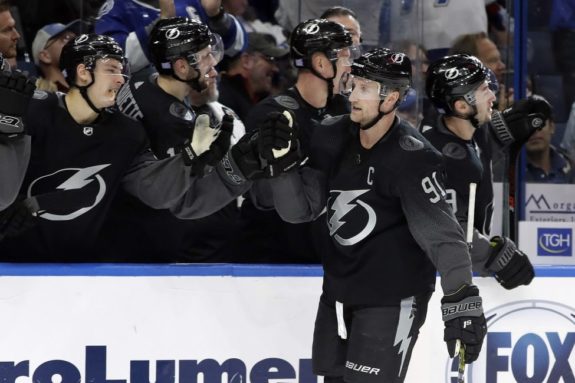
Paired with last season, he’s transitioned into more of an all-around forward who is able to make top-notch passes and still possesses a lethal shot. Nine of his 20 points have come on the power play and his minus-eight doesn’t look pretty, but he’s been the best Lightning forward this season. He sat out against the Anaheim Ducks with a lower-body injury, but he has shown why he’s the captain.
Alex Killorn: A- (20 GP, 5G, 11A)
Killorn had at least 40 points in each of the last two seasons and he is well on his way to another. He’s got 16 points in 20 games while playing an average 17:26 of ice time per game. That pace will likely slow down, but what’s interesting is his Corsi for percentage (CF%) of 49.9. His career mark is 52.7%, but he is taking more defensive zone starts (52.7%) this season than in previous years. This could be a career year for Killorn if he can continue his consistent play.
Brayden Point: B+ (17 GP, 7G, 8A)
Point missed the first three games recovering from hip surgery, but he’s been one of the best Lightning forwards, both with and without the puck. Although he’s not scoring at last year’s pace, he is winning just over 50% of faceoffs and has a CF% of almost 51%.
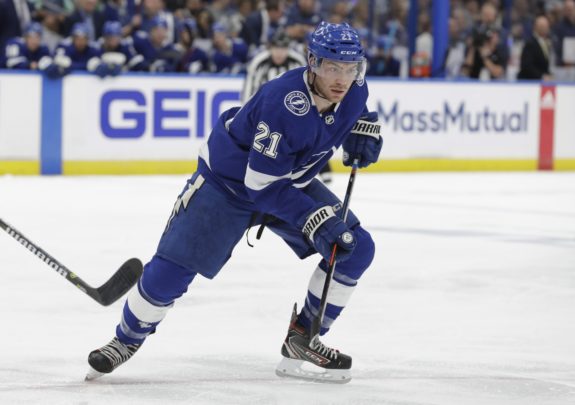
Point will almost always be one of the Bolts top two-way forwards and this year is no different. It’s no coincidence that when he plays well, so do the Lightning.
Nikita Kucherov: B+ (19 GP, 7G, 13A)
The reigning Hart Trophy winner had some trouble getting going this season, but he has been a point-per-game player for the Lightning. No one expected him to repeat his 128-point season, but it’s reasonable to assume he’d be near 100 points. So far, he’s not on pace to reach triple digits.
Kucherov doesn’t have a point in 8 of 19 games this season, but he had two four-point performances against the Toronto Maple Leafs and New York Rangers. In both of those games, he was dominant. As for the rest of the season, he’s been streaky. The Lightning could benefit from the consistent Kucherov they knew last year, but he’s still an elite player and can have an immediate impact on the game.
Ondrej Palat: B+ (20 GP, 7G, 5A)
Palat has almost equaled his goal total from last season (eight) in about a third of the game’s played. He’s been one of the most consistent 200-foot players for the Lightning and is always involved in the play, especially in the defensive end.
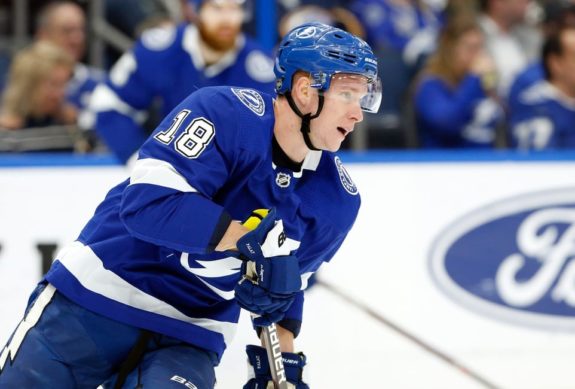
Almost all of his points are at even strength, showing just how good he has been at five-on-five. There’s still room for doubt given his injury history, but he’s second on the team in hits (38), a sign that his body might hold up better this season.
Cedric Paquette: B+ (12 GP, 2G, 5A)
Paquette missed time early with an injury, but since returning to the lineup, he has solidified the fourth line as one of the Lightning’s best in recent memory. He has 7 points in 12 games, a pace that will undoubtedly slow down as the season progresses, but it’s a sign he has a lot of confidence in his offensive abilities. He’s third on the team in hits (34) but the two players ahead of him — Palat and Erik Cernak — have played seven and eight more games, respectively.
Anthony Cirelli: B (19 GP, 5G, 9A)
Cirelli made a name for himself last year as an up-and-coming, two-way forward who was a penalty-killing specialist. The penalty kill for the Lightning, until the last couple of weeks, was not good, but Cirelli and the rest of the penalty killers have found some consistency and gotten back to about league average on the kill (80%).
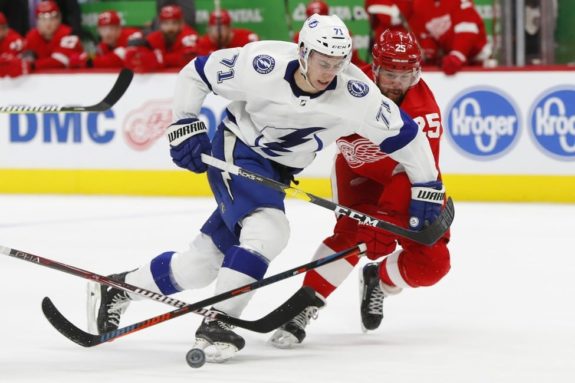
After four points in the first four games, Cirelli mustered just three points over the next 10 games, but he’s currently riding a four-game goal streak, adding three assists in the process. He has 14 points in 19 games and is plus-six, indicating he has been good on both sides of the puck.
Pat Maroon: B (18 GP, 5G, 4A)
Maroon has 9 points in 18 games and has been a role player on the fourth line. He’s not going to light up the scoresheet much, but what he does provide is a steady, uplifting presence in the locker room. He’s a leader, someone the younger players can look up to, and that’s one of the main reasons the Lightning signed him in the offseason. He’s ramped up his physical play over the last few games and is fourth among active players in hits. He has fit in with the Lightning nicely so far.
Tyler Johnson: C+ (20 GP, 4G, 6A)
As a top-six forward, Johnson has 10 points through 20 games and has been fairly consistent this season. He’s plus-two and has only taken one penalty, but he’s also averaging 15:26 of ice time per game, the lowest of his career.
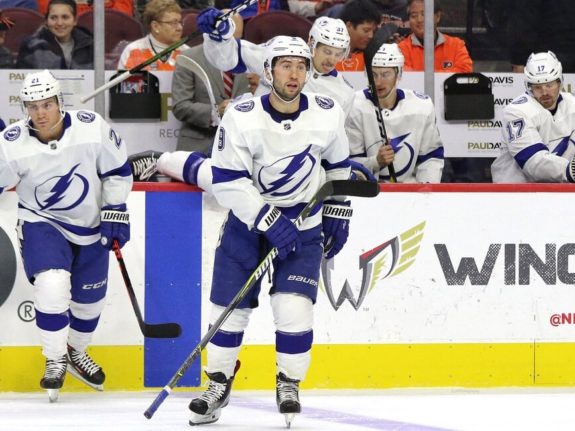
One thing Johnson hasn’t been great at this season is faceoffs, which is at 44.7%. He’s never been great in the face-off dot, but that needs to improve. Although his ice time has been lower, he’s been about what the Lightning expected him to be.
Yanni Gourde: C+ (20 GP, 5G, 8A)
Gourde is making over $5 million for the next five seasons, a contract he earned with two solid back-to-back seasons. This year, he has 13 points in 20 games, which is on pace with previous seasons, but man has he been streaky. He had one stint of three games without a point and another of four games, and while he isn’t expected to score every shift, I’m sure the coaches would like a more balanced game. He’s still strong on the forecheck and his face-off numbers are good this year, but he’s been too inconsistent for anything higher than a C.
Mathieu Joseph: C- (20 GP, 4G, 2A)
After breaking into the lineup last year, Joseph put together a nice rookie season with 26 points in 70 games. He has six points in 20 games this season, which is about his pace from last year, and his CF% is at 52.1%, almost a full percentage point higher than last year. His limited face-off numbers are not good at all (23.1%) but he is a reliable two-way forward who is fairly responsible in the defensive zone. He has the ability to spark the offense but has not been able to do that consistently so far.
Carter Verhaeghe: D (13 GP, 0G, 1A)
Verhaeghe still seems to be finding his way in the NHL as he just has one point in 13 games with the Lightning after leading the AHL in scoring last year.

He has a negative-0.1 point share this season, meaning he hasn’t contributed positively points-wise to the Lightning’s game. He’s also averaging less than 10 minutes a game, but he won’t get more ice time until he proves to be an NHL player night in and night out.
Alexander Volkov: Incomplete (4 GP, 0G, 0A)
Volkov has yet to register his first NHL point in four games and is minus-five so far. Like Verhaeghe, he hasn’t found his game yet after being a highly touted prospect for the Lightning. His numbers will likely get a bit better as he gets more ice time, but he has to prove he can handle any time he gets in the NHL.
Defensemen: Some Good, Some Not So Good
Victor Hedman: A (18 GP, 4G, 16A)
This one comes as no surprise as the Lightning’s best defenseman has 20 points in 18 games this season while playing more than 22 minutes a night on average. He’s second on the team in total point shares — an estimated number of points a player contributes to the team — behind Kevin Shattenkirk.
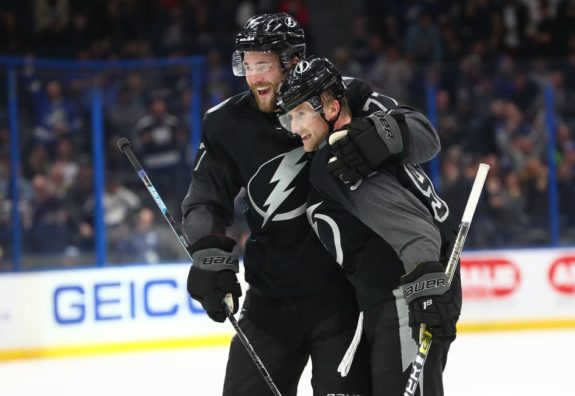
After missing a couple of games and returning in Sweden for the Global Series, his impact was immediately felt as the Lightning looked much more structured and crisp, especially on the power play. He has been one of, if not the best Lightning player this season.
Kevin Shattenkirk: A (20 GP, 5G, 11A)
The Lightning signed Shattenkirk after he was bought out over the summer, and the low-risk move is paying off tremendously. He’s got 16 points in 20 games, playing about 20 minutes per game and is second on the team in plus-minus (plus-8), even-strength assists (8), defensive point shares (1.3) and leads the team in total point shares (2.8). The Lightning have found a dynamic duo in Shattenkirk and Hedman, and both have fed off each other’s success this season.
Mikhail Sergachev: A- (20 GP, 1G, 10A)
Along with Hedman, Sergachev was one of the Lightning’s top defensemen to start the season. He led the team in scoring for the first half-a-dozen games and currently has 11 points in 20 games. His plus-9 rating and 1.4 defensive point share both lead the Lightning. He also has 24 blocked shots and 21 hits.
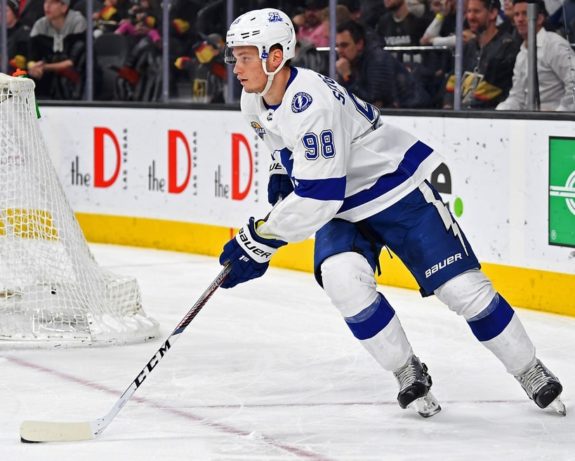
Sergachev’s major downfall this season has been penalties, but that’s been a common theme with the rest of the team. He has 24 penalty minutes this season, which is four less than all of last year, but 10 of those came against the Rangers in one game. Aside from penalty issues, Sergachev has been great.
Braydon Coburn: C (14 GP, 1G, 0A)
It’s hard to give anything but a C to Coburn because he’s only played 14 games and has seen limited ice time on the third pair. He’s got one point and is plus-four while blocking nine shots. The 15-year veteran has been scratched a few times so Jon Cooper and the coaching staff could change things up, but when Coburn is on the ice, it’s nothing extreme to either side. He’s made his share of mistakes but has also played serviceable defense.
Erik Cernak: D
When Cernak inserted himself as a regular last season, he was another shutdown defenseman the Lightning could pair with Ryan McDonagh. He had a strong rookie season, but through 19 games this year, he’s got just one point and is minus-four.
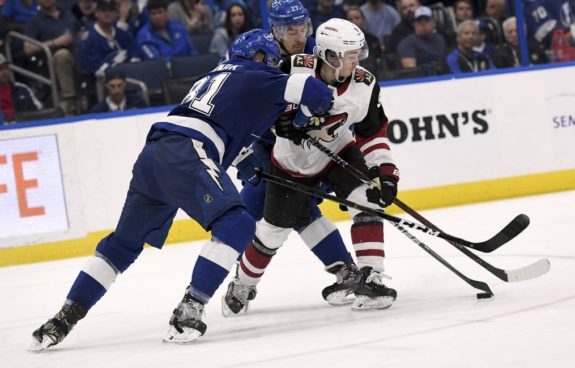
He’s second on the team in blocks (30) and leads the team in hits (40), but other than that, his game has been sub-par this season. The Lightning really need him to find his game and get back to the shut-down player he was last year.
Ryan McDonagh: D (20 GP, 1G, 5A)
The 2018-19 season was arguably the best of McDonagh’s career and the expectations were high headed into this season. His six points in 20 games aren’t terrible, but he’s minus-three and averaging 21 minutes of ice time. In his career, McDonagh has never had a season where he finishes as a minus player, so there is some cause for concern.
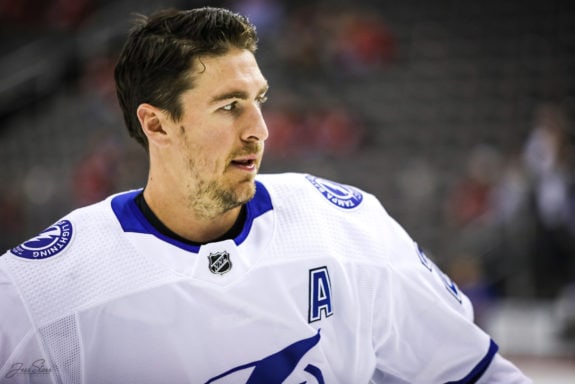
His defensive point shares metric, or how many points he contributes defensively, is at 0.6 this season. The only time it was lower was in the 14 games with the Lightning after he was traded from the Rangers. Let’s hope he can turn it around quickly.
Jan Rutta: Incomplete (5 GP, 0G, 2A)
Rutta has bounced in and out of the lineup this year, but when he’s in, he hasn’t been great defensively. He has a minus-4 rating and a negative-0.2 defensive point share. If those trends continue, he likely won’t find himself in the lineup too often.
Luke Schenn: Incomplete (6 GP, 1G, 0A)
Schenn was in the AHL to start the season but was called up at the end of October. He has just one point in six games and is minus-three, so he and Rutta are in the same boat. However, Schenn does have 12 hits and three blocks, showing more of a willingness (at least statistically) to put his body on the line.
Goaltenders: Backup Besting the Starter
Curtis McElhinney: B+ (6 starts, 3 wins, .911 SV%)
McElhinney signed with the Lightning in the offseason and has been strong for them this year. He has five quality starts in six games and although his 3.47 goals against average (GAA) is a crooked number, his .911 save percentage (SV%) is respectable.
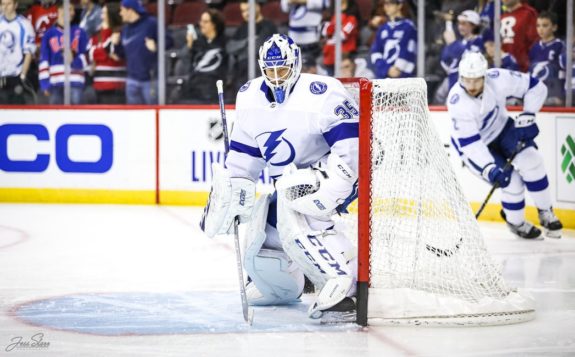
McElhinney had just one start that wasn’t a quality start, according to Hockey Reference, and he’s contributing positively as the backup netminder. That’s all you can ask for from your goalies — keep your team in the game and give them a chance to win, and that’s what he’s done this year.
Andrei Vasilevskiy: D+ (14 starts, 8 wins, .908 SV%)
By the standards he’s set for himself, Vasilevskiy — the reigning Vezina Trophy winner — has not been good. His .908 SV% and 2.88 GAA are well below career marks, as is his negative-0.02 goals saved above average. His .571 quality start percentage is not great, and he also has had two “really bad starts,” which Hockey Reference qualifies as a start with a save percentage below 85%. If the Lightning want to go anywhere this season, Vasilevskiy has to be much, much better.